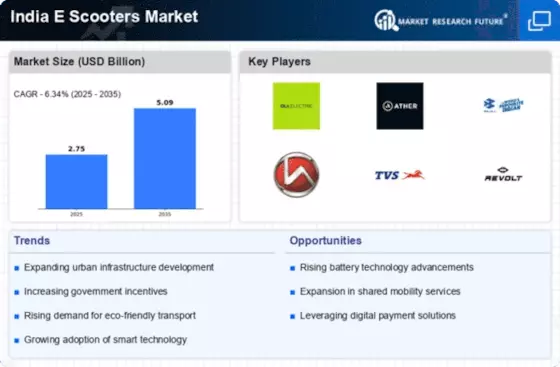Top Industry Leaders in the India Electric Scooter Market
*Disclaimer: List of key companies in no particular order
Top listed global companies in the India Electric Scooter industry:
Hero Electric Vehicles Pvt Ltd, Electrotherm Ltd Avon Cycles Ltd., Benling India Energy and Technology Pvt Ltd., Okinawa Autotech Pvt. Ltd., TVS Motor Co. Ltd., Bajaj Auto Ltd., Ather Energy Pvt. Ltd., Greaves Electric Mobility Private Limited (Ampere Vehicles Pte. Ltd.), Ola Electric Technologies Pvt LTD., and others.
Bridging the Gap by Exploring the Competitive Landscape of the India Electric Scooter Top Players
The Indian electric scooter market is revving up, fueled by rising eco-consciousness, skyrocketing fuel prices, and government incentives. This dynamic landscape is populated by a mix of established players and nimble startups, all vying for a slice of the pie.
Key Players and Strategies:
Traditional Auto Giants: Legacy manufacturers like Bajaj Auto, TVS Motor, and Hero Electric are leveraging their extensive distribution networks and brand recognition to establish themselves. Bajaj's Chetak and TVS' iQube are prime examples of their premium offerings targeting tech-savvy urbanites. Hero, on the other hand, focuses on budget-friendly models like the Photon, catering to value-conscious consumers.
New-Age Startups: Nimble startups like Ather Energy, Ola Electric, and Simple Energy are bringing fresh perspectives and disrupting the market with innovation. Ather's focus on cutting-edge technology and premium build quality has garnered a loyal following. Ola Electric, backed by the e-commerce giant, aims for mass-market penetration with its affordable S1 and S1 Pro models. Simple Energy's One, with its minimalist design and swappable batteries, caters to a niche segment.
Foreign Entrants: Global players like Vespa and Yamaha are also entering the fray, capitalizing on their existing brand recognition and expertise in electric scooters. Vespa's Elettrica and Yamaha's Neo's offer premium options for enthusiasts.
Market Share Analysis Factors:
Product Mix and Pricing: With diverse consumer preferences, manufacturers are offering a range of scooters – affordable budget models, feature-packed premium options, and performance-oriented ones. Pricing strategies play a crucial role, with startups aggressively pushing discounts and promotional offers to gain traction.
Distribution Network and Service Infrastructure: Robust sales and service networks remain key differentiators. Legacy players enjoy an advantage here, while startups are building their presence through partnerships and innovative models like direct-to-consumer sales.
Technology and Innovation: Continuous advancements in battery technology, range, and charging infrastructure are crucial for market success. Startups are leading the charge with proprietary battery management systems, fast-charging networks, and connected vehicle features.
Government Support and Regulations: Supportive policies like FAME-II subsidies and focus on charging infrastructure development are bolstering market growth. Regulatory clarity on safety standards and battery disposal will further shape the competition.
New and Emerging Trends:
Battery Swapping Infrastructure: To address range anxiety, startups like Bounce Infinity and Yulu are pioneering battery swapping networks, offering a convenient and efficient solution for on-the-go charging.
Subscription and Leasing Models: Flexible ownership options like subscriptions and leasing are gaining traction, particularly among young urban professionals who prefer short-term commitments.
Focus on Tier-II and Tier-III Cities: With rising demand in smaller cities, manufacturers are adapting their product offerings and distribution strategies to tap into this potential market.
Focus on Sustainability and Circular Economy: Manufacturers are exploring ways to utilize recycled materials and implement sustainable production practices, aligning with the growing emphasis on environmental consciousness.
Overall Competitive Scenario:
The Indian electric scooter market is currently witnessing intense competition, with each player jostling for dominance. While established players leverage their experience and brand recognition, startups are challenging the status quo with innovation and aggressive pricing. Emerging trends like battery swapping, subscription models, and a focus on smaller cities will further shape the competitive landscape. Success will hinge on adapting to evolving consumer preferences, embracing technological advancements, and building robust infrastructure. Ultimately, the players who deliver a compelling combination of affordability, performance, range, and convenience will stand to gain the most in this burgeoning market.
Latest Company Updates:
Bajaj Auto Ltd.:
- Launched the Chetak electric scooter with a range of 90 km and a top speed of 55 km/h in 2021. (Source: Bajaj Auto website)
Ather Energy Pvt. Ltd.:
- Launched the Ather 450X Gen 3 electric scooter with a range of 108 km and a top speed of 90 km/h in July 2023. (Source: Ather Energy website)
Several new startups are entering the electric scooter market, offering innovative designs and features. (Source: Forbes India, December 2023)











